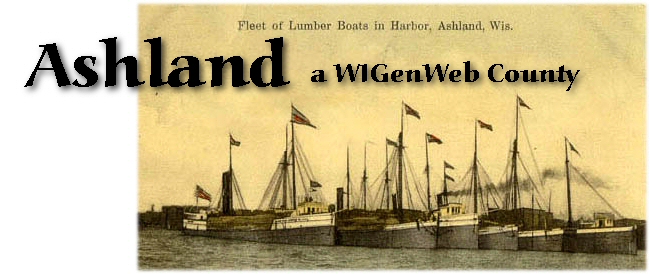
 |
|
The Milwaukee Journal - February 1, 1931 Last week William H. Wheeler, a retired businessman of Beloit, told of the arrival in Wisconsin of his parents, who came out as missionaries to the Chippewa Indians. "Father and Mother left Mackinac in an open boat, transferring to the little schooner Algonquin, at the time the only boat on Lake Superior," William H. Wheeler of Beloit resumed the story of the arrival in Wisconsin of his parents, who had come as missionaries to the Chippewa Indians. "This took them into the old harbor on Madeline Island." "While my parents were both deeply religious, they soon decided that the Indians needed instruction in agriculture quite as much as they did to be indoctrinated with Christian teachings. Father foresaw that the Indians would soon be put on reservations and he began to make preparations to teach them the things they would have to know in order to farm. He thought, too, that they ought to take their place in community life. Civil government was one of the subjects he expected them to learn." "The family home at La Pointe was in the mission house which had been built earlier by Mr. Hall. It is standing today. People usually alluded to it as the 'middle fort.' The dock was the 'new fort' and the old trading post dating back to the French regime, was the 'old fort.' My older brother and sister and two younger children were born in the old mission house." "Father took charge of the mission and Mr. Hall spent his time with the translation. He worked directly from the Greek to the Ojibway." "Father selected some land in the primeval forest, on the Bad River, east of where Ashland is today, as the field for his agricultural experiment. He gave the name Odanah, which means village to the settlement. He moved there May 1, 1845, and there I was born, January 1, 1847. A treaty locating the Bad River Reservation was signed in 1854-5. We usually spent the winters at Odanah and summers on Madeline Island." "I can remember as a small boy seeing a big house built. Those northern pioneer buildings were real works of art and extremely accurate jobs. The French-Canadian experts with their broad axes would hew up the logs until they looked as though they had been planed. Uprights were all grooved and fitted to a heavy sill, including corner posts. Every opening was framed and each finished with a cap timber." "For clapboards they whipsawed timbers. A platform was constructed on which one of the men took his place with the pitman working below. One pulling and then the other, they manipulated the saw." "A house was lathed by splitting cedar logs into thin two-inch strips, and fastened to the wall diagonally with one course laid on top of the other, lattice fashion, properly spaced to hold the plaster of red clay. When this was dry the wall was whitewashed and you had an inviting interior." "My first teacher was Miss Abbie Spooner, who had come from the east with mother and father. The little Indian boys and girls learned exactly as fast as the children of the missionaries. At that time there was no effort on the part of the missionary teachers to obliterate the Indian culture." "We white children learned Indian, the young Chippewas learned English. There were some missionaries who preferred that their children did not associate with the Indian boys and girls, but my father was not one of these." "He was a great believer in the gospel of work and in the duty of himself and his family to set good examples in diligence. At Odanah he took great pride in having a model garden. He also believed that work kept a boy out of mischief. So, in the morning, he would give each of us a stint - set the amount of work that my brothers and I had to get through with that day." "We would set to work weeding the garden, or hoeing it. Pretty soon along would come a group of our Indian companions to lean over the fence and tease us to join them. 'Get your bows and arrows," they would say, "and we will go hunting.'" "'We can't. We go to work.'" "The Indian boys would get their heads together for a moment. Then they would climb over the fence. 'If you will get some tools we will all help… and when we are through we will all go hunting.'" "You may be sure that father had plenty of tools handy for just such emergencies and soon there would be a whole row of boys just eating up the work." "When it was done, we would take our bows and arrows and start for the woods to hunt partridge and squirrels." "Our partridge hunting was lots of fun. You know a male partridge has a way of sitting on a log and drumming. Iuequeenqwaah, the Chippewa call the partridge." "As soon as we caught the sound we would stop and then in single file slowly move in its direction, halting every few feet to listen intently, and peering through the leaves until finally some pair of bright eyes caught sight of the partridge. Usually he was sitting on the trunk of a tree that had been blown down." "Moving quietly like the young Indians that we were, we would stretch out making a wide circle around the drummer on the log and then gradually contract this ring until at last the bird caught sight of one of us." "I can see a partridge now, turning his head nervously in one direction and then the other, as thought it were on a swivel, looking vainly for an opening in the ring that encircled him. As he watched us, we moved closer to him until finally one of us was close enough to let an arrow fly." Hold firm, strong, brown hands, "The rest of us would then rush in sending arrows towards him and about one time in three we would get the bird." "In a pasture on father's place in Odanah was a tall totem post. Father was careful to preserve this post, and the land about it just as it was, for it was the place where the Indians were accustomed to set up their conjuror's lodge. The spruce trees were not cut and even the underbrush was preserved. Every once in a while the Indians would put up the lodge." "They used a cabinet, just as the spiritualistic medium does. I have seen the poles on one of these lodges, frozen into the ground, shake and ring bells as a medicine man worked his incantations. The band of Indians camped nearby would come, one by one, to hold communications with their dead." "Sometimes there would be a Sioux scalp with its long braids placed on top of the totem pole, and there would be dances that circled about it. At such times we boys would be certain to go down to the pasture and join the band. I can hear the rhythmic pounding of drums today. Suddenly it would cease and into the circle would leap the man who had taken the scalp." "'I am about to relate an adventure,' he would begin, speaking slowly and acting out every sentence. 'This adventure happened up the current of the Minnesota River, where it makes the great bend.'" "We understood by this that he was speaking of Granite Falls." "'So high hung the sun,' He continued, raising his arm expressively, 'when I started on the particular adventure I am about to relate. At the end of ten days did I reach the great bend, and…' the speaker was becoming excited as he enacted his story." "'On the following morning as I ran through the grass, crouching low on the other side of the river, suddenly up sprung a strange Indian. He was a Sioux.' The speaker now acted not only his own movements but those of his adversary." "'As we drew near to each other and while he tried to brain me with his tomahawk, did I drop the hammer of my trusty flintlock upon him. And even in his death struggle did I shear him! Sound the drum!'" "If this was the first scalp the Indian had taken he would say. 'This is why I am worthy to wear the eagle feather.'" "I remember hearing one Indian tell about meeting a Sioux, 'floating in his canoe, unsuspicious, and of how he blew his enemies head off.'" "'But' he went on to say, 'in the water he looked a me and laughed, brave even in his death struggle.' The recital usually tended to prove the bravery of the one whose scalp had been taken, because this enhanced the quality of the deed." "Father sent one of these Sioux scalps to the headquarters of the American board in Boston so that they might understand the type of people he was trying to help. And years later I went up to the rooms of the missionary society and saw there, among the idols of India, the Sioux scalp with its long black braids." "I never saw Indians dancing around a white man's scalp. The Chippewa's were allies of the white man from the first."
"The Warren, Lyman and Truman, were Berkshire Hills boys who came to Madeline Island in 1810. They married daughters of Michel Cadotte, the last of the old French fur traders. The grandfather of the Cadotte girls was White Crane, a famous Ojibway chieftain." "Thus Mary Warren, by inheritance, was connected with every phase of Madeline Island history and life. She was sent to an Ohio college, and became a missionary to the Indians at Odanah, Red Cliff, Wisconsin and at Red Lake, Leech Lake and White Earth, Minnesota, where she died only three years ago." "Father carried on an unremitting warfare against those who were perpetually trying to take the Indian's land from him. Very soon after the Bad River Reservation was established, a group of politicians tried to get hold of this pine on the 'school sections' - sections 16 and 36 of every township." "This land was specifically reserved for the support of schools. It was said that these sections did not belong to the Indians at all. The case was carried to the Supreme Court for the Indians. That court decided that on reservations there was no such thing as 'school lands.' That every inch of the reservation belonged to the Indians." "In 1859 came father's trip to Washington to save the Lac Courte Oreilles reservation from the Indian Ring, when he traveled 250 miles on shoe shoes through a blizzard to catch a train at Sparta. He was none too early either, for when he arrived in Washington the bill had been advanced to the third reading." "Father asked for and obtained an interview with President Buchanan, with the result that the bill was wiped off the map. His trip saved the reservation for the Indians but lost him his life. In two months he had lost the use of the right lung. He was never well again." |
|
|
Last Update Monday, 07-May-2018 17:23:36 CDT
 |
WIGenWeb State Coordinator:
Tina Vickery WIGenWeb Assistante State Coordinator: Marcia Ann Kuehl Copyright 2010 by the WIGenWeb Team. All rights reserved. Copyright of submitted items belongs to those responsible for their authorship or creation unless otherwise assigned. |
 |